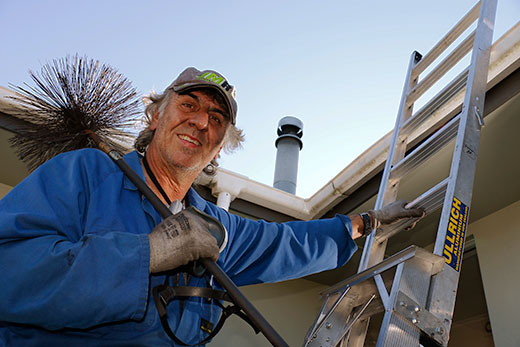It's dirty, sooty work – but someone's got to do it.
With winter finally beginning to bite Tauranga chimney sweeps are being kept busy as residents ensure their chimneys are running at full capacity and keeping the home warm and toasty.
Pete's Flues and Flies owner Peter Ghinis has been kept busy in the lead up to winter. Photo: Bruce Barnard.
So much so there has been a three week waiting list in the city, showing the occupation isn't a thing of the past.
Especially with insurance companies now keeping a close eye on chimney cleanliness should a fire occur.
Pete's Flues and Flies owner Peter Ghinis says since February he has been cleaning, repairing and checking chimneys for any potential hazards, spending up to 40 minutes on each chimney with the odd birds nest and decent blockage of soot.
A usual time of the year for the calls to start to come in with people getting in early with their winter preparations, says Peter.
Though he continues to be inundated as the second wave of cleaning requests rolls in thanks to the recent chilly blast.
'A lot have already had their chimneys done but we are still doing a lot of cleans because the ones that had had their cleaned are using them and then we have another lot of people holding back until it gets cold and are getting them done now,” says Peter.
But many people still aren't aware of the legalities around chimney cleaning and insurance policies, especially since regulations were tightened following the Christchurch earthquakes, he adds.
It's an essential part to meet your insurance policy as most insurance policies may be invalidated by a fire in your chimney if it has not been cleaned in the last 12 months.
'A lot of insurance companies are asking people to clean them every 12 months and by a chimney sweep. Traditionally you have been allowed to do it yourself.”
Insurance Council of New Zealand spokesperson Sarah Knox says even though the insurance market doesn't have exclusions specifically aimed at chimneys, the majority will rely on the reasonable care policy clauses.
'The majority of policies will contain conditions/exclusions in regard to the insured taking or not taking steps to prevent loss and/or maintaining the insured property in good repair; and declining losses where the insured is reckless or grossly negligent in causing the loss.”
Two examples at either end of the acceptance/decline spectrum are:
A customer has no idea that the chimney in the house they have just purchased has not been cleaned for five years, and an old bird nest is blocking the chimney.
The nest catches fire and the house is severely damaged the very first night the customer lights a winter fire. In this case, the insurer would most likely view such loss as being caused accidentally, therefore if all other claim acceptance criteria is met, the policy intent would be for the insurer to accept/settle the claim.
Alternatively a customer has been advised by a builder and/or council inspector, whilst reviewing renovation work at the home, that historical damage to the chimney has severely affected the chimney's structural integrity and therefore not to use the fire place due to the heightened risk of fire damage to the home.
The customer, against such advice, decides to light a fire anyway. Hot embers escape through gaps within the damaged chimney and the house is severely damaged as a result. In this case, the Insurer would very likely view the customer as being reckless or grossly negligent in causing the loss, and as a consequence would probably decline the claim.
Although each insurer is different and these examples just illustrate the principles, stresses Sarah.



0 comments
Leave a Comment
You must be logged in to make a comment.